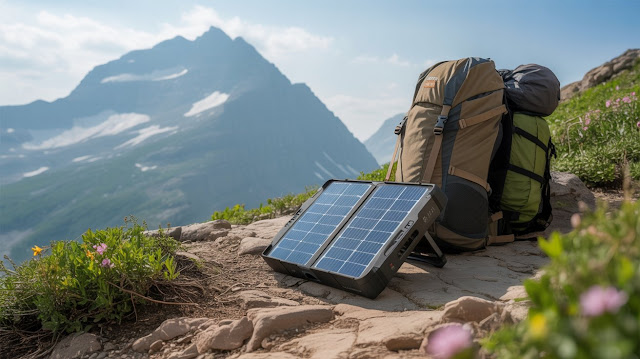Why Hikers Need Lightweight Solar Generators
For outdoor enthusiasts, backpackers, and off-grid adventurers, power access isn't a luxury—it's a necessity. Whether you're navigating with GPS, charging a camera, or simply powering a headlamp, staying connected requires a reliable power source. Traditional generators are far too heavy and bulky. That's where lightweight solar generators come into play.
These compact devices are designed to be portable, quiet, and efficient—perfect for hiking and backpack camping. At EcoVolt Life, we focus on sustainable off-grid energy, and this guide brings you the best portable solar power options built for mobility and rugged conditions.
What Makes a Solar Generator “Lightweight” for Hiking?
Hikers demand gear that is compact, efficient, and lightweight. Here's what to look for:
-
Weight under 10 lbs (ideally)
-
Battery capacity between 150Wh–500Wh
-
Compact solar panels with foldable designs
-
Quiet operation with no fumes
-
Fast charging options (solar + wall outlet)
-
Durability (shockproof, waterproof casings)
The sweet spot for hiking is a balance between power output and portability. Let’s dive into the top models available in 2025.
Top Lightweight Solar Generators for Hikers in 2025
🔋 1. Jackery Explorer 300 Plus
-
Weight: 8.2 lbs
-
Battery: 288Wh (Li-ion)
-
AC Output: 300W (surge 500W)
-
Ports: USB-C, USB-A, AC
-
Best For: Weekend hiking, camera charging, lights
Why it stands out: Compact and ultra-reliable, this generator is favored by minimalist hikers. It's compatible with the Jackery SolarSaga 100W panel and offers USB-C PD charging.
🔋 2. Bluetti EB3A
-
Weight: 10.1 lbs
-
Battery: 268Wh LiFePO4
-
AC Output: 600W (surge 1200W)
-
Ports: AC, USB-C, USB-A, Wireless charging
-
Best For: Tech-heavy hiking trips
What makes it unique: Bluetti’s EB3A includes a built-in MPPT controller, fast recharge (80% in 30 mins), and app control. It offers more wattage than other lightweights, suitable for drones or portable fridges.
🔋 3. Anker 521 PowerHouse
-
Weight: 8.2 lbs
-
Battery: 256Wh LiFePO4
-
AC Output: 200W
-
Solar Input: 65W max
-
Best For: Day hikes and overnight stays
Highlights: Rugged, ultra-quiet, and backed by Anker’s 5-year warranty, this is a no-fuss solution that easily pairs with the Anker 625 solar panel for a full portable kit.
🔋 4. EcoFlow River 2
-
Weight: 7.7 lbs
-
Battery: 256Wh LiFePO4
-
AC Output: 300W (surge 600W)
-
Recharge: 0–100% in 60 min
-
Best For: Hikers who want quick wall charging
Why it’s a top pick: With lightning-fast charging, Wi-Fi control, and versatile solar input, the River 2 is designed for performance and mobility. It’s also TSA-friendly for flying.
🔋 5. Goal Zero Yeti 200X
-
Weight: 5 lbs
-
Battery: 187Wh Li-ion NMC
-
AC Output: 120W
-
Best For: Ultralight hikers, casual power use
Pros: Extremely lightweight and compact. Good for recharging phones, GPS devices, and cameras on the trail.
| Model | Battery (Wh) | Weight | Output (AC) | Solar Compatible |
|---|---|---|---|---|
| Jackery Explorer 300 Plus | 288Wh | 8.2 lbs | 300W (500W surge) | Yes (SolarSaga 100W) |
| Bluetti EB3A | 268Wh | 10.1 lbs | 600W (1200W surge) | Yes |
| Anker 521 PowerHouse | 256Wh | 8.2 lbs | 200W | Yes (Anker 625) |
| EcoFlow River 2 | 256Wh | 7.7 lbs | 300W (600W surge) | Yes |
| Goal Zero Yeti 200X | 187Wh | 5 lbs | 120W | Yes |
Buying Tips: How to Choose the Right Generator for Hiking
-
Trip Duration: Multi-day trips require higher capacity (over 250Wh).
-
Device Usage: For drones or laptops, pick 300W+ models.
-
Weight Limit: If you're hiking long distances, stay under 8 lbs.
-
Recharge Speed: Choose fast-charging models for limited sun exposure.
-
Battery Type: LiFePO4 batteries last longer and perform better in heat.
Solar Panel Compatibility for On-the-Go Charging
Your generator is only as good as its solar panel. Look for:
-
Foldable solar panels under 5 lbs
-
Solar input matching wattage of generator
-
Waterproof / rugged design
-
MPPT controller compatibility
Top panels: Jackery SolarSaga 100W, Bluetti PV120, EcoFlow 110W, Anker 625.
Real-World Use Cases from Hikers
Sophie, Appalachian Trail Thru-Hiker
"I used the EcoFlow River 2 and loved its fast charging. One hour at a hostel was enough to power me for two days."
Marcus, West Coast Trail Camper
"The Bluetti EB3A ran my CPAP machine overnight in a tent. Worth every pound."
Leah, Photographer
"Anker’s 521 PowerHouse kept my drone and cameras alive. It’s lightweight and packs easily into my gear."
Final Verdict: Which is the Best Lightweight Solar Generator for Hikers in 2025?
For most hikers, the Jackery Explorer 300 Plus hits the sweet spot of price, power, and portability. But for those needing extra wattage or smart features, Bluetti EB3A or EcoFlow River 2 are top contenders.
Choose based on your weight tolerance, recharge speed, and how much power you truly need. For long treks, go lighter. For more power, choose a model that balances features with manageable size.
Summary Table: Best Use by Generator
| Use Case | Recommended Model |
|---|---|
| Weekend Backpacking | Jackery Explorer 300 Plus |
| Tech-Heavy Gear | Bluetti EB3A |
| Ultralight Hikes | Goal Zero Yeti 200X |
| Fast Charging | EcoFlow River 2 |
| Budget-Friendly & Rugged | Anker 521 PowerHouse |
Ready to Power Your Next Hike?
Choosing the right portable solar generator for your hiking adventures can change how you experience nature. Don’t let power worries limit your freedom. Let solar energy fuel your adventure—quietly, cleanly, and sustainably.
Explore more off-grid energy tips and buying guides at EcoVolt Life.



.jpg)
.jpeg)
0 Comments